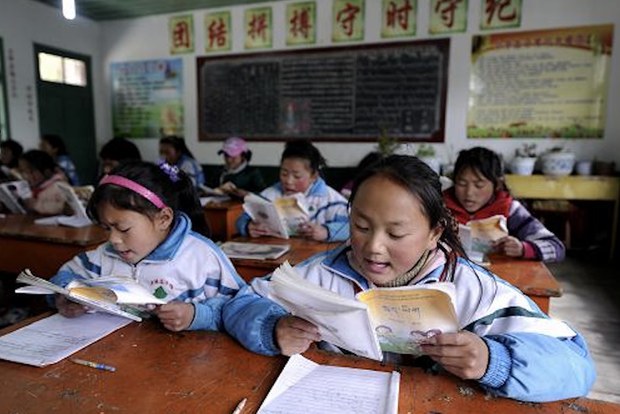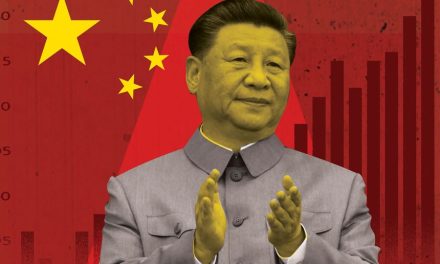(Editor’s note: The world is familiar with the CCP’s ongoing attempted forcible reprogramming of Uighurs, many of them devout Muslims, as well as the general idea that Tibetans too have long been oppressed. Here Sangjey Kep notes that what is happening to the Uighurs — annihilation of their culture and its replacement by the CCP’s definition of Hand culture — is also happening in Tibet. The author is a Tibetan writer living in exile. In the original Chinese version of this article in Yibao Chinese, in referring to his homeland he chooses to use a transliteration of “Tibet,” “Tibote,” rather than the Chinese term Xizang.)
An independent UN human rights expert is “shocked” by the Chinese government’s policy of cultural genocide in Tibet, where nearly one million Tibetan children have been forcibly separated from their families and systematically Sinicized in boarding schools. Since China invaded and illegally occupied Tibet, it has implemented various assimilation policies. However, it continues to use policies anodynely termed “ethnic regional autonomy” and the development of “ethnic culture” to covertly assimilate Tibetans. Since Xi Jinping has monopolized power, he has openly, systematically, and nakedly implemented a policy of exterminating all distinct ethnic groups and their cultures. In “building a solid sense of the Chinese nation’s community,” “promoting Mandarin,” and various other “Sinicization” political movements, the Tibetans are facing cultural genocide.
In recent years, Tibetan human-rights organizations and policy researchers have repeatedly called on the international community to pay attention to the Chinese government’s policy of exterminating Tibetan culture and ethnicity. The Chinese government has set up more and more boarding houses where Tibetan children are required to live from the age of 4, and where it is mandatory to teach exclusively in Chinese. The Tibetan language is deliberately marginalized by the government, to the extent that students are prohibited from even speaking Tibetan in the school, with parents having to accept this Chinese-language training, and requiring them to communicate with their children in Chinese at home. Tibetans in exile have protested many times, and demanded that the Chinese government immediately stop the blatant policy of cultural genocide. Previously, this did not attract the attention of the international community, but after long-term efforts by human-rights groups, headed by the Tibetan Center for Human Rights and Democracy, and the exile community, the international community has begun to pay attention to this cultural-genocide policy implemented by the Chinese government against Tibet.
On February 6, a UN statement said that three UN independent human rights experts, the Special Rapporteur on Minority Issues Fernand de Varennes, the Special Rapporteur on the Right to Education Farida Shaheed, and the Special Rapporteur on Cultural Rights Shantaki Alexandra Xanthaki warned that “[a]round a million children of the Tibetan minority were being affected by Chinese government policies aimed at assimilating Tibetan people culturally, religiously and linguistically through a residential school system.” The statement then quoted the above three Special Rapporteurs directly as saying “We are very disturbed that in recent years the residential school system for Tibetan children appears to act as a mandatory large-scale programme intended to assimilate Tibetans into majority Han culture, contrary to international human rights standards.” (The Chinese version of the statement was itself Sinicized.)
The report, whose English title is “China: UN experts alarmed by separation of 1 million Tibetan children from families and forced assimilation at residential schools,” then quoted the experts again as concluding, “As a result, Tibetan children are losing their facility with their native language and the ability to communicate easily with their parents and grandparents in the Tibetan language, which contributes to their assimilation and erosion of their identity.”
According to this document, “Special Rapporteurs are part of what is known as the Special Procedures of the Human Rights Council. Special Procedures, the largest body of independent experts in the UN Human Rights system, is the general name of the Council’s independent fact-finding and monitoring mechanisms that address either specific country situations or thematic issues in all parts of the world. Special Procedures experts work on a voluntary basis; they are not UN staff and do not receive a salary for their work. They are independent from any government or organization and serve in their individual capacity.”
The UN experts warned that “In recent years, the boarding school system for Tibetan children appears to be a coercive, massive program aimed at assimilating Tibetans into a Han-majority culture, in violation of international human rights standards. We are very disturbed by that.”
The three experts first elaborated on the educational content and social environment of the boarding schools, as well as the expulsion of Tibetan language, culture, history, etc. from them: “Tibetan children are losing their facility with their native language and the ability to communicate easily with their parents and grandparents in the Tibetan language, which contributes to their assimilation and erosion of their identity.”
“In residential schools, the educational content and environment is built around majority Han culture, with textbook content reflecting almost solely the lived experience of Han students. Children of the Tibetan minority are forced to complete a ‘compulsory education’ curriculum in Mandarin Chinese (Putonghua) without access to traditional or culturally relevant learning. The Putonghua language governmental schools do not provide a substantive study of Tibetan minority’s language, history and culture.”
The situation of the new generation of Tibetans raised in such a purposeful and systematically assimilationist education is exactly as noted by these experts: “Tibetan children are losing their facility with their native language and the ability to communicate easily with their parents and grandparents in the Tibetan language, which contributes to their assimilation and erosion of their identity.”
In fact, the Chinese government also promotes Chinese-language training for the children of parents of Tibetan farmers and herdsmen who are outside of schools, and requires parents to communicate with their children in Chinese after they return home during the holidays. The Chinese government does not just assimilate in schools, but requires this assimilation to continue inside the family.
The UN independent human rights experts also noted that the number of boarding schools continues to increase as part of the Chinese government’s program of forced assimilation of new generations of Tibetans. The Chinese government first set up boarding schools on a large scale to implement the policy of cultural genocide in the [the traditionally Tibetan, but parts of which are now located in other Chinese provinces] Amdo and Kham regions. At that time, it was unanimously condemned by the exiled Tibetan society, with Tibetan human-rights organizations playing the leading role. However, the has Chinese government obstinately continued to build more such schools in the two regions. At the same time, there is now a significant increase in boarding schools in the so-called “Tibetan Autonomous Region” itself, noting the beliefs of experts:
“They raised concerns about a reported substantial increase in the number of residential schools operating in and outside of the Tibet Autonomous Region and the number of Tibetan children living in them.“
The report continues, “While residential schools exist in other parts of China, their share in areas populated by the Tibetan minority is much higher, and this percentage has been increasing in recent years. While on the national level the percentage of boarding students is more than 20%, information received point to the vast majority of Tibetan children in residential schools, almost one million children in total.”
Experts and scholars on Tibet consider this number to be a very conservative estimate of the number of Tibetan students in boarding schools.
Experts also unambiguously note that China has closed schools for the Tibetan community and increased the number of boarding schools in towns and cities where Han Chinese are overwhelmingly the majority. Of course, over the past few years the Chinese government has closed almost all the private and semi-private schools that it had allowed to operate.
Quoting the Special Rapporteurs directly, the report continues, “This increase in the number of boarding Tibetan students is achieved by the closure of rural schools in areas which tend to be populated by Tibetans, and their replacement by township or county-level schools which almost exclusively use Putonghua in teaching and communications, and usually requiring children to board. Many of those residential schools are situated far from the family homes of students boarding in them.”
The Chinese government’s purpose is obvious — to carry out cultural genocide by completely isolating Tibetan children from Tibetan society, culture, beliefs, etc. Therefore, the experts expressed “alarm”:
“We are alarmed by what appears to be a policy of forced assimilation of the Tibetan identity into the dominant Han-Chinese majority, through a series of oppressive actions against Tibetan educational, religious and linguistic institutions.”
While shocked by the Chinese government’s assimilation policy, the experts also pointed out that the behavior of the Chinese government has trampled on many more basic human rights of Tibetans: “the policies run contrary to the prohibition of discrimination and the rights to education, linguistic and cultural rights, freedom of religion or belief and other minority rights of the Tibetan people.” The experts also added: “This is a reversal of policies that were in some ways more inclusive or more accommodating.”
Whether China’s policies have in fact been “inclusive” and “accommodating” since its occupation of Tibet is controversial. Of course, in the past, the Chinese government may have made some “compromises” due to its political considerations or to cope with international pressure, but these were also stopgap measures without any positive lasting effect.
If we speak of a reversal for Tibet, the only one under the Chinese government’s more than 70 years of colonial rule is that Tibetans are already a minority in Tibet. In addition, the new generation of Tibetans cannot speak the region’s native language. Once again, the major monasteries in Tibet have been turned into party schools.
China’s invasion of Tibet has caused 1.2 million unnatural deaths of Tibetans since the 1990s. In the 21st century, the Chinese government is once again destroying the souls of more than one million Tibetan children. The international community must take immediate action and intervene. More importantly, Chinese intellectuals, scholars, and the public should criticize and condemn the Chinese government’s Tibet policy, and refuse to act as an accomplice of the CCP.























